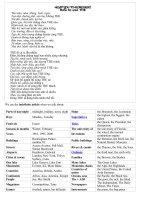Complex today: How the Internet has change
Bạn đang xem bản rút gọn của tài liệu. Xem và tải ngay bản đầy đủ của tài liệu tại đây (1.39 MB, 61 trang )
The complex today
How the internet has changed and how we’re stumbling with our own feet
By Markus Sandelin
The steam engine sparked the industrial
revolution.
It was people who improved
and built upon that technology,
who really made the revolution
happen.
We have become lazy in thinking that we are
technologically advanced and that we know how
to use new technologies efficiently.
The Internet was first and foremost a technology
for improving communications and it did that
extremely well.
Amazing illustration by Tim Knapen (www.pacesetter2000.be)
15 years ago the world wide web surfaced, which
was just as paramount of a change than the steam
engine.
It was just one application to the technology of
the internet.
I think the majority of us does not understand
how complex the web has become.
From 360 to 365
The web used to be nothing more than a digital
dead end.
However, think of how much the web has
changed our lives. We handle our banking,
communicate with our friends and families, file
our taxes, apply for jobs, do our shopping, look for
relationships and even order our pizzas online.
The largest library and encyclopedia in the
history of mankind is in the web.
We use the web every day. Still,
we design the majority of the
web like it’s a digital poster.
Calvin & Hobbes by the grand master Bill Watterson
Or at least they seem to expect it
to cost that or less, since it’s only
digital.
The people expect to have their
needs served online - their time is
worth more than the service the
companies are providing.
Why aren’t companies investing in the
opportunity to the end users them help
themselves every day of the year?
From common to individual
When is the last time you have used a website
that did not ask for your information, registration
or other personal information?
When was the last time you
actually gained any value
from giving out that
information apart from
social media?
We are still using personal information just to
identify.
Not to serve them better or to deliver more
meaningful usability, but just to separate one user
from each other.
Online banks could earn so much more by just
analyzing their CRM data and delivering
something more relevant to even two groups of
people (e.g. rich and poor).
We have enough data to be hyper-relevant. To
individualize the experience.
Amazon has been doing this for 10 years. That’s
why they’re leading the race. It is not difficult, it’s
just complicated.
Are companies really
taking users and their data,
behavior and personalities
into account in their online
experiences?









